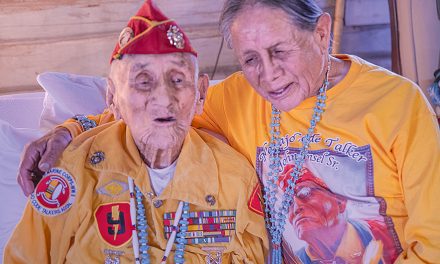
50 Years Ago: At first, MacDonald acts to ensure tribe is not ripped off
Back in the 1960s, when Raymond Nakai was chairman of the tribal Council, the tribe entered into agreements with several companies to provide them loans to help them to set up shop on the reservation.
Many of these ventures went down the tubes, losing the tribe millions of dollars. But just a few months after taking office, Peter MacDonald decided he wasn’t going to sit back and let these companies take advantage of the tribe.
So, on July 13, 1971, he had his general counsel, George Vlassis, file a suit against Westward Coach Manufacturing Company in an effort to get back the million dollars it had loaned the company in 1969 to build a trailer and camper manufacturing plant in Utah. The plant was built and the company opened for business with about a dozen Navajo employees.
The venture, however, never really took off and the plant closed down a few months after it opened. MacDonald had a lot of questions about why it failed and whether the company had complied with provisions of the loan that required the use of all of it for the Navajo operation.
It turned out that the company had not complied with the provisions of its loan, which had happened before when the tribe loaned money to companies, but instead of chalking this up to another bad deal, MacDonald decided to sue to get the company to pay back the loan.
The tribe, he said, was no longer going to sit back and allow these companies to take advantage of the tribe.
The company counter sued and the matter was in the courts for years until the two parties agreed to a settlement that allowed the tribe to get part of its loan paid back.
As I remember, it wasn’t a lot – a couple of hundred thousand – but MacDonald wanted to send a message that the tribe would not let outside companies come in and rip off the tribe.
Of course, the tribe would continue to give companies loans to get them to set up shop here and most of the ventures would fail so if there was a message in MacDonald’s action, it was soon forgotten.
Housing for teachers
The Navajo Times reported that the Rough Rock Community School has come up with a unique and relatively inexpensive way to solve one of its major problems in hiring teachers – where to house them after they are hired.
Dillon Platero, director of the school, said he has been working with land owners in the community to get them to build small homes on their land that could be rented out to teachers or others hired by the school.
In the past, the school had a hard time finding homes for teachers because of its remote location.
Once a land owner signed up for the program, members of the school and community got together one weekend to actually construct the house with lumber paid for by the Office of Navajo Economic Opportunity, which also provided skilled personnel to oversee construction.
Once the building is constructed, it is rented out to school employees with the landowner being allowed to keep the rental payments. Five homes are to be built this year with another 10 to be built in the future.
This is the only time I have heard this being done so there must have been some problems with the program that did not allow it to be established in other remote locations. But on the surface, it seemed to be a good idea.
Non-Navajo reporter ejected
Speaking of the top story, it appears that the Navajo Times and the editors of the Gallup Independent are in a debate over something that happened when Vlassis gave a report to the Navajo Tribal Council about the Westward Coach lawsuit.
Because he was going to give the Council sensitive legal advice about the tribe’s strategy, a non-Navajo reporter for the paper was ejected and the meeting was held behind closed doors.
The Independent protested in an article in the paper the following day, saying how will members of the tribe learn what happened if the press is barred from the meeting.
The Independent reported it had made an agreement with MacDonald when he took office that would allow the paper’s reporter to attend closed meetings with the stipulation that the paper would not print anything of a sensitive nature.
Chet MacRorie, the publisher of the Navajo Times, pointed out that while he was a big supporter of transparency in the tribal government, he could understand why Vlassis was within his rights to eject the Independent reporter in this case.
This was basically, he said, a meeting between Vlassis and his client, which was the tribal government and therefore it was protected by attorney-client privileges.
But if Vlassis allowed a non-Navajo to attend the meeting, even though he promised not to print anything coming out of it, the tribe would lose that privilege and the other side could force anyone attending that meeting to reveal anything that was said.
So if Vlassis talked about the weaknesses of the tribe’s case, any member of the Council would be required to talk about it when they were disposed or questioned at a hearing.
The ironic part of all of this is that if the Times had one of its Navajo reporters attend a closed Council session, that person would be allowed to stay during the discussion since Vlassis was technically representing all Navajos and the reporter would be considered a client.
And while there would be nothing to keep the Navajo reporter from writing about what was said at the meeting, the other side would be barred from using it in court because of the attorney-client privilege.








 Highway 264,
Highway 264, I-40, WB @ Winslow
I-40, WB @ Winslow